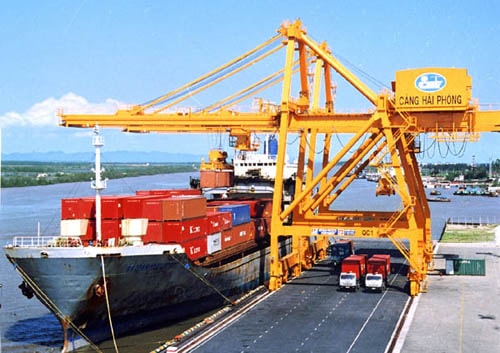Merchant ships, state ships used for commercial purposes on the seas
(Baonghean.vn) -Question 20. What is the legal status of merchant ships and state ships used for commercial purposes operating in sea areas?
Reply:Merchant ships consist of many components and types; therefore, their legal status as regulated by international law is also different. To distinguish these differences, people divide merchant ships into 2 types:
- Private merchant ship.
- State merchant ship.
The rights and obligations of merchant ships are specified depending on each sea area.
 |
| Container ship at Hai Phong port. Photo: NDH |
According to international practice, when foreign ships want to pass through the internal waters of a coastal country, regardless of the type, they must request permission and receive permission from the coastal country in advance and must operate on the prescribed route. When allowed to enter the internal waters to reach a country's port, merchant ships must go to a designated location to complete entry procedures. After completing the procedures, the ship will be guided into the port by a pilot boat. When entering the internal waters of a country, all means of communication and electronic technical observation must be sealed, all communication of the ship to the country or to a certain location must go through the communication center of the local port. All activities of the ship such as mooring, contacting other ships, sending people and equipment to measure and survey, explore meteorological and hydrological factors, depth, bottom quality, take photos and videos, draw or record equipment in the port, military equipment, economic facilities, scientific research facilities on the way or in the port area, even raising anchor and moving position in the port must have the consent of the host country, otherwise it will be considered a violation of the law of the coastal country and will be handled according to the law of this country depending on the level.
Merchant ships operating in waters under the jurisdiction of coastal states, if they violate the laws of those coastal states, will be handled according to the laws of those coastal states. In particular, if criminal offenses occur on foreign merchant ships, do coastal states have the right to prosecute them?
In principle, any criminal offense committed on board a ship is governed by the laws of the country where the ship is located. The coastal state may have jurisdiction over the above violations in the following cases:
- Criminal offenses involving nationals of coastal countries;
- Criminal offenses committed in the territory of the coastal State involving the ship's personnel;
- Criminal offenses committed in the territory of a coastal country involving nationals of the coastal country fleeing on board foreign vessels.
For criminal offences committed on board a ship which relate only to internal matters of the ship, the coastal State shall only proceed with proceedings provided that:
- When requested by the captain or consul of the country of which the ship is a national;
- When it is necessary to apply sanctions for smuggling of prohibited goods such as drugs, weapons, and slaves;
- When the crime has an impact on disrupting public order and security of the coastal country;
- When the consequences of the crime affect the sovereignty and rights of the coastal State over its maritime zones.
Article 27 of the 1982 United Nations Convention on the Law of the Sea provides: "The coastal State may not exercise its criminal jurisdiction on board a foreign ship passing through the territorial sea to arrest any person or to conduct any inquiry in connection with any crime committed on board the ship during its passage through the territorial sea, except in the following cases:
a. If the consequences of the violation extend to the coastal State.
b. If the violation is of a nature to disrupt the peace of the country or good order in the territorial sea.
c. If the master or a diplomatic or consular officer of the flag State requests the assistance of the local authorities;
d. If such measures are necessary for the suppression of illicit traffic in narcotic drugs or psychotropic substances".
Regarding civil jurisdiction over merchant ships, Article 28 of the 1982 UN Convention on the Law of the Sea stipulates: "The coastal State shall not stop or divert a foreign ship passing through the territorial sea for the purpose of exercising civil jurisdiction over a person on board the ship"; "The coastal State may not impose civil penalties or arrests on a ship except in respect of obligations or liabilities incurred by the ship while passing through or in order to pass through the maritime zone of the coastal State". Of course, this provision "does not affect the rights of the coastal State to impose civil penalties or arrests under its domestic law against a foreign ship lying in the territorial sea or passing through the territorial sea after leaving internal waters".
According to Q&A on Vietnam's Law of the Sea
(To be continued)






